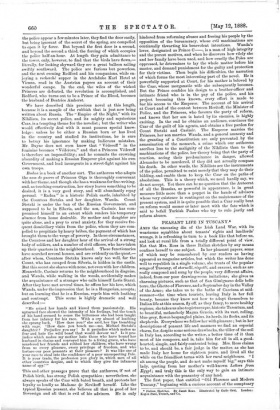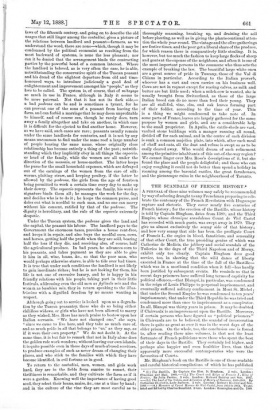PEASANT LIFE IN TUSCANY.*
AMID the unceasing din of the Irish Land War, with its wearisome squabbles about tenants' rights and landlords' wrongs, it is refreshing to turn to a book like that before us, and look at rural life from a totally different point of view. Not that Mrs. Ross in these Italian sketches by any means confines herself to one subject. In her pleasant papers, some of which may be remembered by our readers as having appeared as magazine articles, but which the writer has done well to republish in a single volume, she treats of the popular songs of Tuscany, of stornelli, rispetti, and eanzoni, such as are really composed and sung by the people, very different affairs, indeed, from our poor drawing-room imitations; she gives us charming pictures, such as that of San Giraignano delle belle torre, the Ghetto of Florence, and a September day in the Valley of the Arno ; she takes us to the baths of Casciana at mid- summer—the time when tourists, leaving Italy in her full beauty, because they know not how to adapt themselves to Italian life at this season, fly off, as they fancy, to more healthy regions; she takes us also to picturesque, historic Tarentum, and to beautiful, melancholy Magna Urania, with its vast, rolling, blue-grey, flower-bespangled plains, its herds, its flocks, and its shepherds. Everywhere we follow her with pleasure ; but in her descriptions of peasant life and manners we find an especial charm, for, despite some serious drawbacks, the tiller of the soil in Italy has, according to the writer, a better time of it than most of his compeers, and is, take him for all in all, a good- hearted, simple, and fairly contented being. Mrs. Ross claims to be, and should be, a fair judge in the matter, as she has made Italy her home for eighteen years, and lived all the while on the friendliest terms with her rural neighbours. "I sit among the people, and do not make myself big," says this lady, quoting from her mother's well-known Letters from Egypt and truly this is the only way to gain an intimate acquaintance with the peasantry of any land.
The first paper, that entitled "Old Florence and Modem Tuscany," beginning with a curious account of the sumptuary
• Italian SkOches. By Janet Ross. Illustrated by Carlo Oral. London: Segni Paul, Trench. and Co.
laws of the fifteenth century, and going on to describe the old usages that still linger among the contadini, gives a picture of the relations between landlord and peasant—farmers, as we understand the word, there are none—which, though it may be 'condemned by the political economist as resulting from the most backward of systems, is none the less pleasant; nor
can it be denied that the arrangement binds the contracting parties by the powerful bond of a common interest. Where the landlord is beloved, as is very often the case, he is able, notwithstanding the conservative spirit of the Tuscan peasant and his dread of the slightest departure from old and time- honoured ways, to introduce judiciously a good deal of enlightenment and improvement amongst his "people," as they love to be called. The system is, of course, that of natayage so much in use in France, although in Italy it seems to be more paternal. Not that it has not its dark side,— a bad padrone can be and is sometimes a tyrant, for he can prevent one of the sons of a peasant from leaving the farm, and can forbid a marriage that he may deem unprofitable to himself, and of course can, though he rarely does, turn away a family altogether and take on another, in which case it is difficult for the ejected to find another home. However, as we have said, such cases are rare ; peasants usually remain under the same landlords for centuries, and it is not by any means uncommon to find under the same roof a large number of people bearing the same name, whose originally close relationship has become entirely a thing of the past; notwith- standing which they implicitly obey in all things the capoccio, or head of the family, while the women are all under the direction of the tnassaia, or house-mother. The latter keeps the purse for the small household expenses, which are defrayed 'out of the earnings of the women from the care of silk-
worms, plaiting straw, and keeping poultry, if the latter be allowed by the padrone, the girls from the age of fourteen being permitted to work a certain time every day to make up
-their dowry. The capoccio represents the family, his word or signature binds them all ; he manages the work for the day,
and decides who is to do it ; he keeps the common purse, and doles out what is needful to each man, and no one can marry without his consent, ratified by that of the padrone. The dignity is hereditary, and the rule of the capoccio extremely despotic.
Under the Tuscan system, the padrone gives the land and the capital, the peasant his labour. The landlord pays to the 'Government the enormous taxes, provides a house rent-free, and, keeps it in repair, and also buys the needful oxen, cows, and horses, getting half the profit when they are sold, bearing half the loss if they die, and receiving also, of course, half the agricultural produce. In bad years, he advances corn to his peasants, and takes payment as they are able to give it him in oil, wine, beans, &c., so that the poor man, who would perhaps otherwise starve, is able to tide over bad times. It is true that under such conditions the landlord is not likely to gain inordinate riches ; but he is not looking for them, his life is not one of excessive luxury, and he is happy in his friendly relations with his people, taking part in their little festivals, addressing even the old men as figliuolo ink and the women as bambina raja, they in return speaking to the illus. trissinto with a dignified freedom by no means wanting in respect.
Although going out to service is looked upon as a degrada- tion by the Tuscan peasantry, those who do so being either childless widows, or girls who have not been allowed to marry as they wished, Mrs. Ross has much praise to bestow upon her Italian servants. "We have not changed one," she says, "since we came to live here, and they take as much care of, and as much pride in all that belongs to us,' as they say, as if it were their own property." We do not doubt it. At the same time, it is but fair to remark that not in Italy alone does the golden rule work wonders ; without leaving our own islands, it is quite possible even in these days of much-abused servitors, to produce examples of such as never dream of changing their places, and who stick to the families with which they have become identified, in evil fortune as in good.
To return to the contadini, men, women, and girls work hard, they are in the fields from sunrise to sunset, their thriftiness is remarkable, and they cultivate the farm as if it were a garden. Knowing well the importance of having good seed, they select their beans, maize, &c., one at a time by hand ; and in the culture of the vine they are most careful as to
thoroughly seasoning, breaking up, and draining the soil before planting, as well as in giving the plants continual atten- tion the whole year round. The vintage and the olive gatherings are festive times, and the poor get a liberal share of the produce, for which reason there is comparatively little stealing. It is, however, but too much the fashion to keep large flocks of sheep and goats at the expense of the neighbour, and often it is one of the most important persons in the commune who thus sets the example of breaking the law. The beautiful large white oxen are a great source of pride in Tuscany, those of the Val di Chiana in particular. According to the Italian proverb, whoever has a cart and oxen carries on his business well. Cows are not in request except for rearing calves, as milk and butter are but little used ; when a milch-cow is wanted, she is usually brought from Switzerland, as those of the large Italian breed can do no more than feed their young. They are all stall-fed, vine, elm, and oak leaves forming part of their fodder, according to the time of year. This is a thing we might condescend to take note of. In some parts of France, leaves are largely gathered for the same purpose by women and girls, and are a considerable help to the small proprietor. In Apulia, the cattle-sheds are vast, vaulted stone buildings with a manger running all round, divided off for each animal, and in the centre of each division is sunk a common majolica plate, into which, after each meal of chaff and oats, all the dust and refuse is swept so as to be easily cleared away. Who would dream of such refinement among the primitive inhabitants of this out-of-the-way region P We cannot linger over Mrs. Ross's descriptions of it, but she found the place and the people delightful; and those who can enjoy roughing it could not do better than spend a holiday in roaming among the baronial castles, the great farmhouses, and the picturesque ruins in the neighbourhood of Taranto.



































 Previous page
Previous page